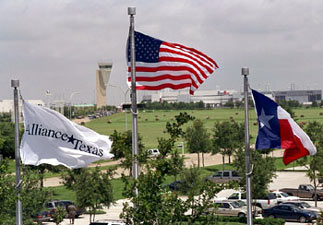 |
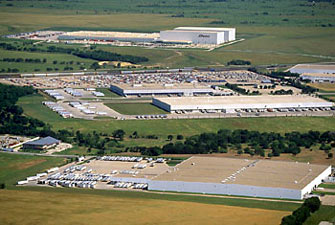 |
| The 1,671 acres (668 hectares) added to Alliance Texas (pictured) will bring the sprawling development's total size to 11,000 acres (4,400 hectares) in four cities: Fort Worth, Roanoke, Haslet and Westlake. |
Massive & Multimodal:
1,671-Acre AllianceTexas
Expansion Could
Create 10,000 Jobs
by JACK
LYNE, Site Selection Executive Editor
of Interactive Publishing
FORT WORTH, Texas — If you build
it, they may — or may not — come. But if you build it as massive
and as multimodal as If you build it, they may - or may not - come.
But if you build it as massive and as multimodal as AllianceTexas
, the odds that companies with ambitious expansion designs will
indeed come soar way up above average. Already rich in its
transportation and site options, AllianceTexas has now grabbed a huge
chunk of additional cachet on that account. Hillwood
Properties, the Fort Worth-based developer of AllianceTexas,
announced on Nov. 18th that the mammoth site is expanding by a whopping
1,671 acres (688 hectares).
That brings AllianceTexas' total size to
11,000 acres (4,400 hectares) in four cities: Fort
Worth, Roanoke, Haslet and Westlake. More
significantly for corporate site selectors, the project will substantially
strengthen the sprawling development's direct rail- and air-service
access.
The expansion, which came together after
18 months of negotiations, involves three key players: the
Burlington Northern and Santa Fe Railway
Company (BNSF), Hillwood Properties, and the
M.T.
Cole Trust.
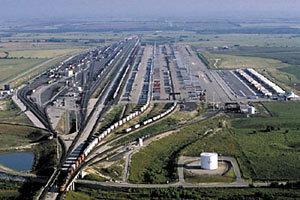 |
| The Burlington Northern and Santa Fe Railway Company is adding 327 acres (131 hectares) at its Logistics Park-AllianceTexas (pictured), which already spans 750 acres (300 hectares) and ranks as one of the largest U.S. intermodal facilities. |
"The ability to provide our carload customers with direct rail service is the one component missing in this industry-leading logistics park," BNSF Vice President of Business Development Fritz Draper commented after the deal was sealed. The addition of direct-rail loading is the latest step in BNSF's evolution in AllianceTexas. The pre-merger Santa Fe Railway first located inside the development, setting up an automotive industry logistics facility. BNSF continues to operate that 55-acre (22-hectare) facility, which serves as a major distribution site for DaimlerChrysler, Honda, Hyundai and Kia. But a significant part of the company's current focus is on Logistics Park- AllianceTexas. Spanning 750 acres (300 hectares), the operation already ranks as one of the largest U.S. intermodal facilities.
 |
 |
| Hillwood Properties President Mike Berry (pictured) estimated that AllianceTexas' major new addition in its acreage will generate 10,000 jobs and $40 million in annual property taxes. |
Providing direct rail-car loading strengthens the ability of Logistics Park- AllianceTexas to assuage a growing concern in site-selection logistics. Truck transportation's cost-saving allure has faded of late, what with multiple revenue drains that include soaring fuel costs, mandated shorter drive times for truckers and ever-worsening traffic congestion. Those factors have made many companies wary of locating at sites that depend entirely on truck transportation. They want choices - the more, the better.
"By adding this important component to Logistics Park-AllianceTexas," said Draper, "we will be able to provide our customers with a full suite of transportation options - intermodal, trans-load, automotive and carload service, with distribution and warehousing - in one location."
BNSF's expansion includes purchasing 38 acres (15 hectares) for rail-spur right of way. Specifics and financial terms haven't been made public for the numerous land buys involved in the AllianceTexas expansion. BNSF also hasn't
 |
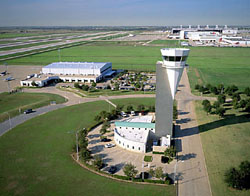 |
| With the expansion, Alliance Airport, AllianceTexas' centerpiece (pictured), will add more sites with direct runway access and will lengthen its runways. |
May Draw Aerospace Manufacturers
"It's only natural for Hillwood, the M.T. Cole Trust and BNSF to work together to continue to attract new businesses, jobs and economic development to AllianceTexas," Berry said. "The additional acreage increases AllianceTexas' position as one of the world's premier logistics centers. We can now offer rail- served buildings at Logistics Park-AllianceTexas and more runway-accessible land to make the development even more appealing as a site for aerospace manufacturing."
The development's additional runway access is part of how M.T. Cole Trust figures in the project. Created in the 1930s, the trust owns more than 10,000 acres (4,000 hectares) in southern Denton County. Far more to the point for this project, the group had long owned about 3,000 acres (1,200 hectares) in and around Alliance Airport, AllianceTexas' centerpiece.
Acquiring that acreage will do more than allow the development to add more runway-accessible sites. The Cole land acquisition will also enable Alliance Airport to extend its runways to 11,000 feet (3.33 kilometers),
Berry noted.
To Handle Ever-Larger Distribution Centers
That wasn't supposed to be the shape of things to come. Technology would surely drive the creation of smaller distribution centers, prevailing conventional wisdom once had it. That, however,
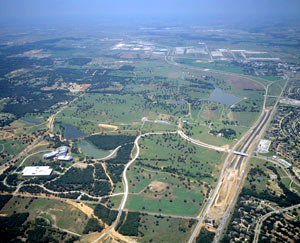 |
 |
| AllianceTexas' largest expansion came from purchasing the 2,300 acres (920 hectares) of the adjoining Circle T. Ranch (pictured left in an aerial view). Today, the huge tract is home to corporate campuses, championship golf courses and myriad recreational options. |
Distribution facilities of between 100,000 sq. ft. (9,000 sq. m.) and 125,000 sq. ft. (11,250 sq. m.), for example, were the size norm in the middle and latter part of the 1990s. All that's changed, though. Many companies are putting strong emphasis on rationalizing inventory and optimizing distribution efficiencies by creating fewer, larger operations.
That trend is reflected in research from ProLogis. Today's distribution centers average more than 250,000 sq. ft. (22,500 sq. m.), according to the Aurora, Colo.-based distribution solutions specialist. Distribution facilities as large as 1 million sq. ft. sq. ft. (90,000 sq. m.), in fact, are actually a fairly commonplace phenomenon in today's environment.
Largeness is also obviously part of AllianceTexas' latest extension of its boundaries. But that expansion ranks only as the second-biggest addition in the development's history. The still-reigning standard was set by the 2,300 acres (920 hectares) that AllianceTexas tacked on in 1994 through the purchase of the adjoining Circle T. Ranch.
Today the Circle T acreage houses not only corporate campuses, but also championship golf courses and a wide range of recreational options. (Today's AllianceTexas has another significant non-just-business component: Heritage, a high-tech mixed-use community.)
To date, some 4,000 acres (1,600 hectares) of AllianceTexas have been developed for occupancy. More than 130 companies have set up operations inside the development, housing 20,000 jobs in 23.5 million (2.12 million sq. m.) of space.
AllianceTexas' other A-list tenants include American Airlines, Bell Helicopter, Federal Express, General Mills, Hewlett-Packard, Intel, Kraft Foods, Maytag, SC Johnson Wax, United Parcel Service and Textron.
Carolina Expansion Creating 187 New Jobs
by JACK LYNE,Site Selection Executive Editor of Interactive Publishing
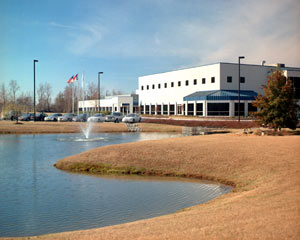 |
| Danish pharmaceutical giant Novo Nordisk will add 187 new positions in a $100- million expansion of its existing insulin plant (pictured) in Clayton, N.C. |
CLAYTON, N.C. — Novo
Nordisk is priming the growth pump at the Danish drug-maker's
insulin plant in Clayton, N.C., readying
to add 187 jobs in a 181,000-sq.-ft. (16,290-sq.-m.), $100-million expansion.
"Plans for the expansion demonstrate Novo Nordisk's commitment to serving
the insulin needs of people who are living with diabetes throughout
the U.S.," Novo Nordisk Pharmaceuticals General Manager John R. Pratt
said on Oct. 28th in announcing the project.
The two-phase project will certainly bolster
the company's ability to serve those needs - and Novo's bottom line
as well. Phase I will more than double the Danish pharmaceutical giant's
U.S. insulin- production capacity, said Pratt. Competing directly with
Eli Lilly and Sanofi-Aventis,
Novo currently holds slightly more than one-third of the U.S.
insulin market. The Carolina expansion's first stage will be completed
in 2006, the company is projecting.
The Clayton project's Phase II will involve
adding two new assembly and packaging lines for FlexPen, Novo's pen-line
device for insulin delivery, Pratt explained. Projected for completion
in 2007, the second-stage expansion will add administrative and storage
space as well at the Clayton operation. The Carolina plant currently
employs some 380 workers. The 187 new jobs, which are for engineers
and machine operators, will pay annual salaries averaging $52,000, company
officials said.
Novo's decision to substantially enlarge
the Clayton operation comes almost three years after the Bagsvaerd,
Denmark-based firm pulled the plug on a $200- million, 200-job expansion
at the same site. Novo by late 2001 had progressed on that project to
the point of issuing bids to construction contractors. That plan went
south in early 2002, though, after the company began a cost-containment
initiative. Research delays were also a factor in putting the Clayton
plant's expansion on hold, Novo officials said.
This time around, though, no such obstacles
stand in the way, noted Pratt.
 |
| Gov. Mike Easley (pictured speaking at this year's Work-Force Development Summit in Greensboro) called the expansion by "a world leader in diabetes care . . . a real win for our state." |
Habits: All Boosting Novo's U.S. Growth
The company has more than doubled its U.S. market share since 1999 after entering into a key alliance with Wal-Mart. Compensating for Novo's lack of a major American sales force, that marketing deal allows the world's largest retailer to sell Novo's insulin under Wal-Mart's ReliOn label. Wal-Mart, which accounts for around 8 percent of all U.S. insulin sales, markets ReliOn through its Wal-Mart and Sam's Club pharmacies.
Novo is reportedly currently seeking to further enlarge its U.S. market share through forming additional alliances with other major American vendors. In addition to Wal-Mart, the company's current U.S. alliance partners include Aradigm Corporation, with which the Danish firm has a co-development agreement for a pulmonary insulin delivery system, and Abbott Laboratories, with which Novo has a U.S. and Latin American licensing agreement for Gabitril, an epilepsy treatment.
Novo's U.S. sales have also gotten a boost from the American public's poor eating habits and lack of
 |
 |
| Phase II of Novo's Clayton expansion will involve adding two new assembly and packaging lines for FlexPen, Novo's pen-line device for insulin delivery (pictured). | |
In the company's Clayton expansion, however, North Carolina is the key alliance partner. Novo will receive as much as $2.3 million over 10 years through the state's Job Development Investment Grant program.
Gov. Mike Easley (D) called the expansion by "a world leader in diabetes care . . . a real win for our state. This announcement builds on our already thriving pharmaceutical industry here in North Carolina. This is further proof that our investments in education, infrastructure and work-force development are paying off."
Will Involve Site Novo Donated
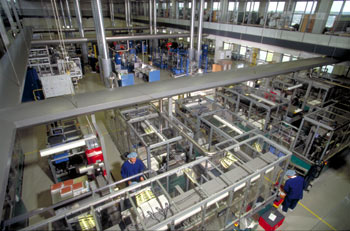 |
| The company is already producing the FlexPen insulin delivery devices in Novo's plant Hillerod, Denmark (pictured). |
Novo in December of 2003 donated eight acres (3.2 hectares) of its large tract in Clayton to the Johnston County Industrial Development Corporation (JCIDC). The JCIDC entered into a marketing agreement with Johnston Community College. The county group agreed to build a 30,000-sq.-ft. (2,700- sq.-m.) on-campus center for corporate training and continuing education. In addition, the JCIDC will also staff and develop the curriculum for the center, which is scheduled for completion in August of 2005.
In a sense, Novo's donation is coming full circle with the Clayton expansion. The state's incentives include a $250,000 training grant from the One North Carolina Fund. And the state's community college system will deliver the customized training program for Novo employees.
"One of the main reasons Novo Nordisk is expanding here is because of the training their employees will receive through the community college system," Easley said.
Worldwide, Novo employs some 19,600 workers in 69 nations. In addition to insulin, the company is a major player in areas that include growth hormone therapy, women's hormone therapy, and hemostasis (which involves stopping blood flow during surgery).
with New 250- Worker Operation
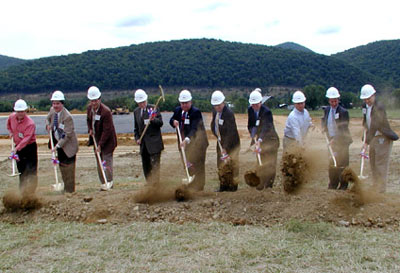 |
| Déjà vu all over again: American Woodmark's announcement of a new 250- worker mill in west Maryland comes only five months after the company said that it would build a 500-employee assembly plant in that same state region. Company officials joined state and local officials on Aug. 5 in Allegany County to break ground to begin the construction of the assembly plant (pictured). |
by JACK LYNE,Site Selection Executive Editor of Interactive Publishing
GARRETT COUNTY, Md. — American
Woodmark's expansion pace in west Maryland is beginning to recall
Secretariat's 1973 Triple Crown clip at the Baltimore-based Pimlico
Race Course. It was only five months ago that the Winchester, Va.-based
cabinetry manufacturer announced that it would locate a new 500-employee
assembly plant in Allegany County, Md. And now American Woodmark is
at it again, unveiling plans on Nov. 19th for its new lumber drying
and milling operation in west Maryland's Garrett
County that will create 250 more
new jobs.
The company, which offers than 220 cabinet
lines, will locate the new drying and milling facility on a 37-acre
(15-hectare) site in the Keysers Ridge Industrial Park, American Woodmark
Chairman and CEO Jake Gosa explained in
 |
| American Woodmark's new mill "represents the culmination of years of effort to expand Garrett County's value-added and secondary wood business base," said County Commission Board Chairman Ernest Gregg (pictured). |
announcing the project. Preparation will begin immediately at the site,
located just west of the city of Grantsville, Gosa explained. American
Woodmark hasn't yet determined an exact construction timetable for the
Garrett County operation, company officials said.
"This announcement signals the strength
of our company, as we continue to work hard to develop the capacity
required to meet the growth demands of our customer base," Gosa noted.
"This is our No. 1 priority."
Northeast/Mid-Atlantic Demand
That Maryland operation announced in June is adding a badly needed missing link in the company's U.S. production network. Demand for American Woodmark's products has been particularly strong in the U.S. Northeast and Mid- Atlantic regions. At first, the company met that demand from its Berryville, Va., assembly plant. The Virginia plant, though, was soon swamped with more volume than it could handle.
So American Woodmark scrambled to fill that gap - albeit cost-ineffectively. The company used its existing plants in Gas City, Ind., and Jackson, Ga., to serve unmet Northeast and Mid-Atlantic demand. The Allegany County assembly plant, which is on track to come online by early next year, will give the company "the ability to maximize synergies with its existing operations in Virginia and West Virginia, and to more easily supply the growing Northeast and Midwest markets," Gosa explained.
The new Garrett County facility will further muscle up American Woodmark's ability to serve Northeast and Midwest demand. The lumber drying and milling operation in west Maryland will lie near both the Berryville plant and a new cabinet-component plant near Moorefield, W.Va., that the company announced last year.
"American Woodmark's decision . . . to acquire additional land in western Maryland is truly a
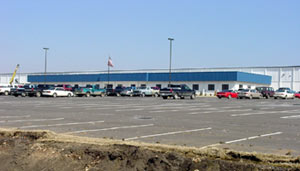 |
| American Woodmark U.S. expansion blitz last year included expanding its plants in Arizona and Kentucky, and completing construction of a new lumber processing plant in Hazard, Ky., and a new assembly plant (pictured) in Tahlequah, Okla. |
Company's Rapid U.S. Expansion
American Woodmark moved to meet that bullish demand in its 2003-04 fiscal year by expanding existing plants in Kingman, Ariz.,
 |
| Gov. Robert Ehrlich (pictured) called American Woodmark's double-shot expansion in western Maryland "truly a testament to the outstanding work force, quality of life and supportive business environment." |
State and county officials said that they'll be providing the Garrett County project with a package of subsidies. Those incentives' total estimated value hasn't yet been announced. The Maryland Department of Business and Economic Development will provide project assistance for land acquisition, work-force training and recruitment. Garrett County's aid will consist of strengthening the project's infrastructure.
Garrett County Commissioners Board Chairman Ernest Gregg called American Woodmark's new mill "a great fit for Garrett County. [It] represents the culmination of years of effort to expand Garrett County's value-added and secondary wood business base.
"In addition to the direct jobs associated with the American Woodmark operation, the project will generate additional jobs for businesses providing raw materials and support services," said Gregg, who is in his fifth term on the Garrett County board.
 PLEASE
VISIT OUR SPONSOR • CLICK ABOVE
PLEASE
VISIT OUR SPONSOR • CLICK ABOVE 
Site
Selection Online
©2004 Conway Data, Inc. All
rights reserved. Data is from many sources and is not warranted
to be accurate or current.